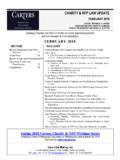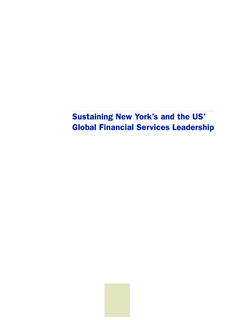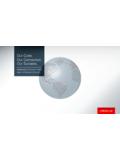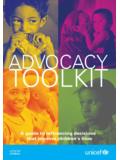Transcription of Draft Code of Conduct for persons carrying on lobbying ...
1 Draft Code of Conduct for persons carrying on lobbying activities Introduction Under section 16 of the Regulation of lobbying Act 2015 (the Act) the Standards in Public Office Commission (the Standards Commission) may produce a Code of Conduct for persons carrying on lobbying activities with a view to promoting high professional standards and good practice . The purpose of this Code is to govern the behaviour of persons carrying on lobbying activities. The Code will provide principles by which persons carrying on lobbying activities may Conduct their lobbying activities, in order to ensure that the lobbying activities are carried out transparently and ethically.
2 Preamble lobbying activities are undertaken by many people and organisations in relation to a broad range of matters. lobbying activities are a legitimate means of access to parliamentary, government and municipal institutions. lobbying activities contribute to informed decision-making by elected and appointed public officials. The legitimacy of lobbying is reinforced when lobbying activities are carried out transparently and in an ethical manner. In support of the Act s objectives to foster transparency and the proper Conduct of lobbying activities, this Code of Conduct sets out several principles by which persons carrying on lobbying activities should govern themselves in the course of carrying out lobbying activities, namely.
3 1) Demonstrating respect for public bodies 2) Acting with honesty and integrity 3) Ensuring accuracy of information 4) Disclosure of identity and purpose of lobbying activities 5) Disclosure of interests 6) Preserving confidentiality 7) Avoiding improper influence 8) Observing the provisions of the Regulation of lobbying Act 9) Having regard to the Code of Conduct While the Act governs communications with Designated Public Officials (that is, Ministers, Ministers of State, and ministerial advisors, elected representatives and certain senior public servants), the principles of the Code should apply to all communications with persons in public office, whether prescribed for the purposes of the Act or not.
4 The Act, together with this Code of Conduct and associated regulations, guidelines and standards of Conduct applicable to Office Holders, elected representatives and public servants, aims to ensure that lobbying activities are conducted in accordance with public expectations of transparency and integrity, and that decisions are made in the public interest. Code of Conduct persons carrying on lobbying activities shall have regard to the following principles: 1) Demonstrating Respect for Public Bodies persons carrying on lobbying activities should act in a manner that demonstrates respect for public bodies, including the duty of public officials to serve the public interest.
5 A person carrying on lobbying activities should not act in a manner that shows disrespect for public bodies and should refrain from directly or indirectly exerting undue pressure on an elected or appointed public official. persons carrying on lobbying activities should not expect preferential access or treatment from elected or appointed public officials. A person carrying on lobbying activities should not use a former or existing working relationship with an elected or appointed public official to secure preferential access or treatment. 2) Acting with Honesty and Integrity persons carrying on lobbying activities should Conduct all relations with public bodies and elected or appointed public officials with honesty and integrity.
6 persons carrying on lobbying activities should not seek to obtain information or influence decisions dishonestly or by use of undue pressure or inappropriate behaviour. persons carrying on lobbying activities should make their case without manipulating or presenting information in ways that could be regarded as dishonest or false. persons carrying on lobbying activities should avoid any Conduct or practices likely to bring discredit upon themselves, the persons they represent or the public bodies they are contacting. 3) Ensuring Accuracy of Information persons carrying on lobbying activities should take all reasonable measures to satisfy themselves that the information they are providing to public bodies or to elected or appointed public officials is accurate and factual.
7 If a person carrying on lobbying activities considers that there is a material change in factual information provided and the person believes that the public body or elected or appointed public official may still be relying on that information, the person should, insofar as is practicable, provide accurate and updated information to the public body or to the elected or appointed public official. 4) Disclosure of Identity and Purpose of lobbying Activities A person carrying on lobbying activities should always identify themselves by name and, where applicable, the body or bodies they work for. Where a person is carrying on lobbying activities on behalf of a client or other person the person carrying on the lobbying activities should disclose the identity of the client or other person and the nature of their relationship with that person.
8 A person carrying on lobbying activities must not conceal or try to conceal the identity of a client, business or organisation whose interests they are representing. A person carrying on lobbying activities should always inform the elected or appointed public official of their interests, objectives or aims they promote (or those of the client they represent) and the purpose and intended results of the communication. 5) Disclosure of interests A professional lobbyist or third party carrying on lobbying activities on behalf of other persons should properly inform the client, business or organisation whose interests they are representing about any potential conflicts of interest, or of any competing interests arising from their professional practice or other business, family or social associations.
9 A professional lobbyist or third party should not represent conflicting or competing interests without the informed consent of those whose interests are involved. persons carrying on lobbying activities on behalf of a client or other person should not knowingly make misleading, exaggerated or extravagant claims about, or otherwise misrepresent, the nature or extent of their access to elected or appointed public officials. 6) Preserving Confidentiality A person carrying on lobbying activities should use and disclose information received from a public body or an elected or appointed public official only in the manner consistent with the purpose for which it was shared.
10 A professional lobbyist or third party carrying on lobbying activities on behalf of other persons should not use, for purposes other than those of their mandate, confidential information obtained in the course of their lobbying activities and should not divulge confidential information relating to their clients unless they have obtained the informed consent of their client, or disclosure is required by law. 7) Avoiding Improper Influence A person carrying on lobbying activities should inform themselves of the policies of the Government and public bodies they are communicating with in relation to restricting the acceptance of gifts or hospitality by elected or appointed public officials and should not, in the course of their lobbying activities, make any offer of gifts or hospitality which might cause an elected or appointed public official to breach any law, regulation, rule or standard of Conduct applicable to them in relation to the acceptance of gifts or hospitality.






